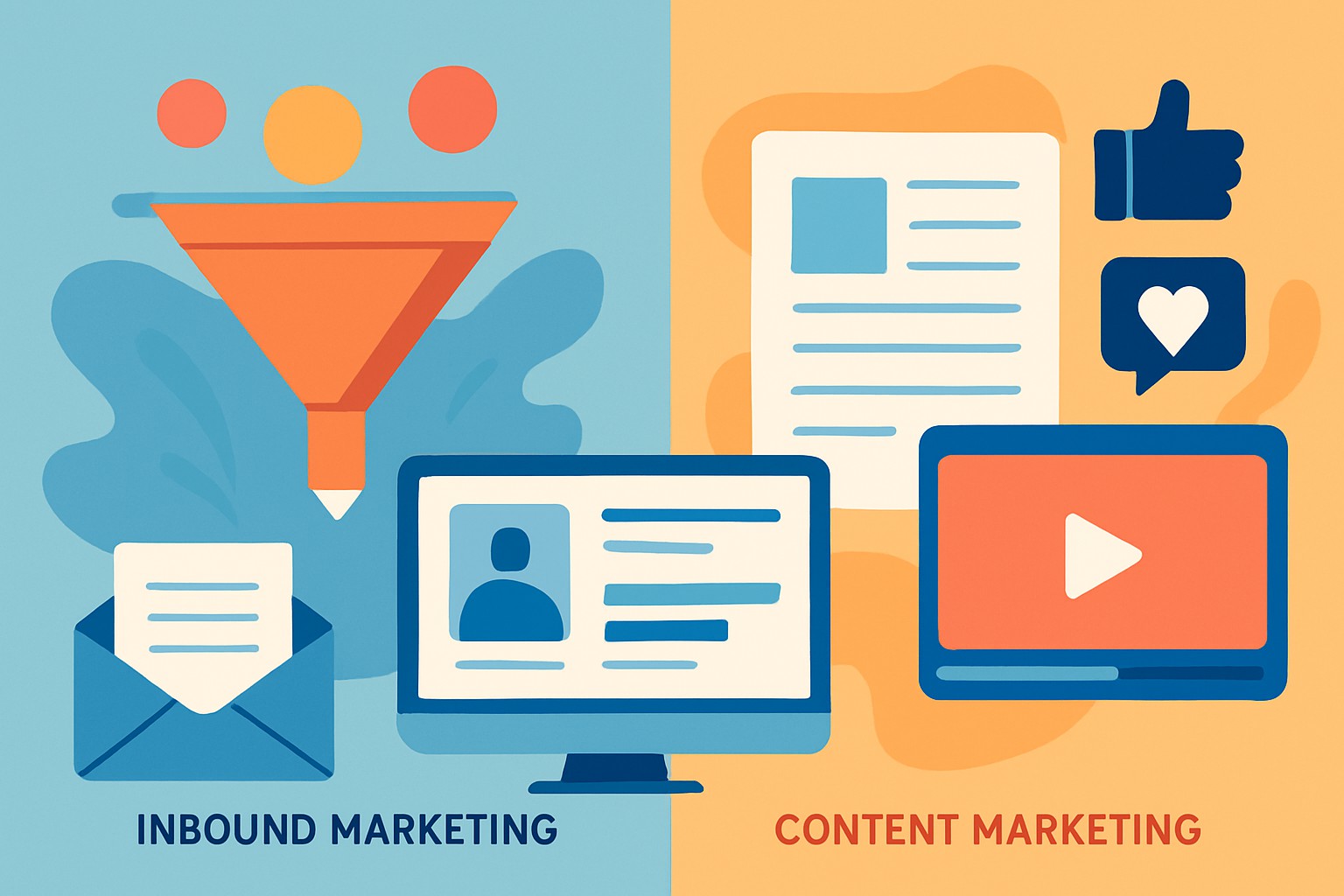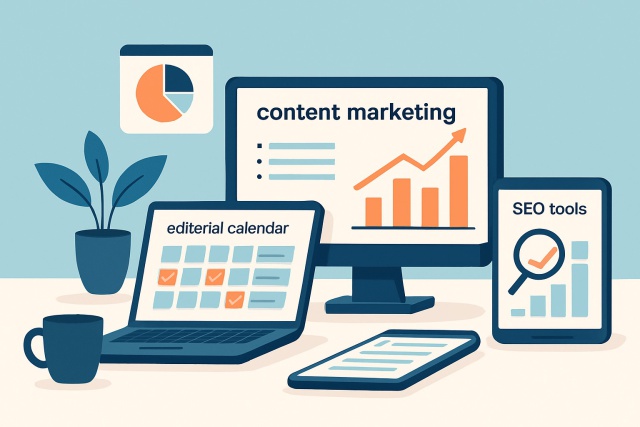
Best book on SEO for beginners and seasoned pros
Master SEO with the best book on SEO tailored for beginners and pros alike. Explore top picks, exper...

People often toss around the terms inbound marketing and content marketing like they’re interchangeable but they each have their own flavor and focus. Getting a solid grip on these differences is important for marketers who want to sharpen their game.
Inbound marketing is a well-rounded approach designed to draw in and engage customers throughout their buying journey. It relies on valuable and relevant content and experiences. Content marketing fits into this bigger picture by focusing on crafting and sharing genuinely helpful content that aims to educate and build real connections with audiences.
When you pit inbound marketing against content marketing from a strategic viewpoint, inbound usually casts a wider net. It shepherds prospects through the classic stages of awareness, consideration and decision while aiming to turn curious onlookers into loyal customers who stick around for the long haul. Content marketing focuses on crafting valuable content that shines a spotlight on your brand and educates potential customers while building trust. Content marketing is a key player in the inbound marketing game but inbound strategies don’t stop there. They also bring lead nurturing, CRM integration and personalized communication into the mix to steadily boost engagement and conversions.
| Feature | Inbound Marketing | Content Marketing |
|---|---|---|
| Primary Goal | Attract, engage, convert, and keep customers happy | Create and share content that truly matters |
| Focus Areas | Spans the entire customer journey, from first hello to loyal fan | Mainly zeroes in on awareness and consideration |
| Content Role | Plays a vital supporting role in a bigger picture | The star of the show and main deliverable |
| Lead Nurturing | Actively nurtures leads, often tied to CRM and email efforts | More hands-off, mostly about educating people |
| Measurable Objectives | Tracks conversion rates, customer loyalty, and pipeline growth | Looks at content engagement, site traffic, and social buzz |
| Brand Engagement Duration | Focused on building deep, lasting relationships | Aims to boost brand awareness and polish reputation |
Inbound marketing and content marketing may dance around the same stage but they each have their own moves. Content marketing is all about crafting and sharing a broad spectrum of content designed to inform and truly engage your audience. Inbound marketing takes those content efforts and combines them with SEO, social media, lead capture forms, email campaigns and conversion funnels. It gently steers prospects along the path that leads right to a purchase.

Visual diagram illustrating the marketing funnel stages covered by inbound marketing vs content marketing
Both inbound and content marketing rely on a solid tech stack for SEO research, content management, analytics and lead tracking. Tools like Moz and Mangools bring serious horsepower with their SEO features that are essential for both strategies. Moz shines with deep keyword research, thorough site audits and link analysis. It is perfect for big-picture inbound campaigns. Mangools keeps things straightforward and user-friendly. It delivers quick keyword and backlink insights that speed up content optimization and get things moving.
Moz stands out as a solid, feature-rich SEO platform that’s well suited for savvy digital marketers and businesses aiming to up their organic search game. That said, its steeper learning curve and higher price tag might give beginners and smaller teams a bit of a run for their money.
SEO professionals, digital marketing teams, and businesses looking for an all-in-one SEO solution packed with advanced analytics and content optimization tools.
Mangools shines as an affordable, easy-to-use SEO toolkit delivering a well-rounded feature set that covers the bases for everyone from beginners to seasoned pros. It might not flaunt some of the advanced tricks or deep integrations you’d find in premium software, but it offers solid bang for your buck — and keeps itself relevant with regular updates, which I’ve found is half the battle.
This one’s a solid match for small to medium-sized businesses, bloggers, and digital marketers after a straightforward yet comprehensive SEO toolkit without the headache or price tag of enterprise-level solutions.
Measuring ROI and success tends to play out differently when you pit inbound marketing against content marketing. Inbound marketing usually zeroes in on lead generation and conversion rates to show how it is moving the needle for the business. Meanwhile, content marketing shifts gears, focusing on user engagement, content reach and social shares as clues to brand visibility and audience buzz.
Inbound marketing often demands heftier budgets and bigger teams and requires a longer runway since it covers crafting content, fine-tuning SEO, and juggling email marketing and lead management. Content marketing, on the other hand, tends to be more flexible and gentle on the wallet. It can easily scale from one-person shows to full campaigns depending on what you are aiming for. Smaller businesses or startups usually find content marketing a smoother entry point.
| Aspect | Inbound Marketing | Content Marketing |
|---|---|---|
| Budget Range | Usually falls somewhere between $5,000 and over $50,000 per month, depending on how big or small you want to play | Typically runs from $1,000 up to around $15,000 per month, give or take |
| Team Size | Often calls for a dream team of specialists in SEO, content, CRM, and email automation — you know, the full cast | Most of the time, just a handful of content creators and editors can handle the load |
| Tool Subscriptions | Calls for a mix of tools like CRM systems, marketing automation, and SEO platforms (think Moz and the like) | Mainly leans on content management and SEO tools, such as Mangools, to keep things ticking |
| Time to ROI | Usually takes a bit of patience — we are talking medium to long term, roughly 6 to 12 months or more before you see much | Generally quicker on the uptake, often showing results in the short to medium term, about 3 to 6 months |
| Complexity | Fairly intricate stuff, needing coordination across several channels, which can be a juggling act | Moderately complex, focusing mostly on creating and sharing content without the circus tricks |
Deciding between inbound marketing and content marketing often comes down to your business goals, budget and available resources. Inbound marketing shines when you want to build a fully integrated long-term plan that pulls customers through various channels.
Comparing Moz and Mangools gives you a pretty clear snapshot of pricing, features, ease of use, and who they’re best suited for. It’s like checking under the hood before picking your next SEO ride — helping marketers find the best fit without any guesswork.
| Comparison Points |  |  |
|---|---|---|
| Pricing | $99–$249 per month across Standard, Medium, and Premium plans | $29.9–$79.9 per month with Basic, Premium, and Agency plans |
| Key Features | Keyword Research, Site Audit, Link Building, Rank Tracking | Keyword Research, Rank Tracking, Competitor & Backlink Analysis |
| Ease of Use | Intuitive interface but may take some time for beginners to get comfortable | Very user-friendly with simple navigation and straightforward workflows |
| Target Audience | Digital marketers, SEO professionals, and businesses of all sizes | Individuals, startups, and small to medium businesses |
| Competitor & Backlink Analysis | Offers advanced backlink analysis and competitor link tracking tools | Provides solid competitor insights and backlink auditing tools |
| Scalability | Well-suited for growing businesses and larger enterprises | Best for small to medium-sized businesses; less ideal for large enterprises |
| Pros | Comprehensive SEO toolkit, widely trusted in the industry, broad features, regular updates | Affordable, easy to learn, accurate rank tracking, strong competitor analysis |
| Cons | Pricing is on the higher side, somewhat complex for newcomers, limited customization options | Lacks some advanced features, fewer integrations, not geared toward large-scale use |
| Go to Moz Site | Go to Mangools Site |


14 articles published
Driven by a passion for ethical marketing, Garrett Meadowlark has transformed the field with his unconventional yet highly effective methods that prioritize authenticity and transparency.
Read Pages
Master SEO with the best book on SEO tailored for beginners and pros alike. Explore top picks, exper...

Discover how publishers can harness content marketing strategies step-by-step to boost engagement, d...

Unlock top affiliate earnings in the investment niche by promoting high paying programs like Semrush...

Unlock proven subreddit growth strategies that help you build a vibrant, engaged community. Learn ex...